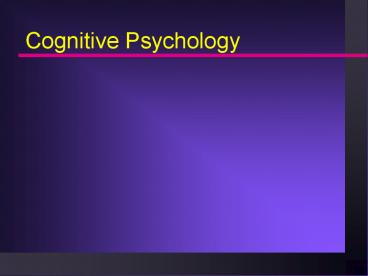Cognitive Psychology PowerPoint PPT Presentation
1 / 18
Title: Cognitive Psychology
1
Cognitive Psychology
2
The Black Box
Stimulus
Response
The Black Box of the Behaviorists
3
The Black Box Revealed!
Stimulus
motivation
s c h e m a
Response
STM
imagery
LTM
MIND
perception
computer
4
Kohlers Apes
- Stranded on Tenerife during WWI
- studied instances of problem solving which
required restructuring of the situation - i.e. banana out of reach
5
Antecedents
- Descartes (rationalist)
- mind-body duality
- rational mind - mechanical body (reflex arc)
- Locke (empiricist)
- sensory experience the only reliable source of
knowledge - Kant
- attempted to reconcile the rationalist/empiricist
points of view - active mind - affected by outside stimuli
6
Key Features of Cognitive Science
- Representations
- symbols, rules, images
- De-emphasis on Affect, Context, Culture, History
- Interdisciplinary
- input from Neuroscience, Psychology,
Anthropology, Linguistics, Philosophy and
Artificial Intelligence - Rooted in Classical Philosophical Problems
- Computer model
- input, processing, output
7
Knowledge Representation
- Knowledge is posited as a variety of mental
representations, including propositions,
productions, and images. - Propositions -- smallest information unit,
knowing about something -- declarative knowledge. - Productions-- procedural knowledge, knowing how
to do something. - Production systems -- similar to S-R
chains--several productions linked.
8
Key Elements
- Learning is an active process
- Brain functions influence learning
- Memory can be modelled as information storage
- Individual differences should be considered when
designing learning processes
9
(No Transcript)
10
Brain functions influence learning
- Synapses
- Three Brains
- Two halves
- Brain waves
11
(No Transcript)
12
Encoding and Storage
- Perception
- Attention
- Meaning
- Elaboration
- Organization
- Spread of Activation
- Schemata
13
Scripts
- The Restaurant script
- Roles (customer, waiter/ress, cashier
- props (menu, food, check, tip)
- activities (ordering food, paying bill)
- script varied ie fast food vs five star
14
Individual differences
- Learning Styles
- Gardners Theory of Multiple Intelligences
- Zennheusers Theory of Meaning vs Automatic
15
Multiple Intelligence
- Linguistic
- Visual/Spatial
- Interpersonal
- Bodily/kinesthetic
- Logical/Mathmatical
- Musical
- Intrapersonal
- Naturalistic
16
Applications of Cognitivism
- Ausubel - Advance organizers -- anchoring
mechanisms for subsuming new knowledge - Elaboration - provide analogies or carry out
discussions to encourage students to link old to
new knowledge - Embedded questions used to elicit association
with previous knowledge - Compare and contrast to encourage deep processing
- Dialog
- Spatial or concept mapping
17
Applications of Cognitivism
- Novice to expert--instructional activities
matched to learner's cognitive state. - Other mathemagenic activities--Processing
initiated via supplied lesson processing
activities - Other generative activities
- note-taking
- mnemonic aids
- outlining
18
Gagnes Events of Instruction
- gain attention
- inform learner of the objective
- stimulate recall of prior learning
- present the stimulus
- provide learner guidance
- elicit performance
- provide feedback
- assess performance
- enhance retention and transfer

